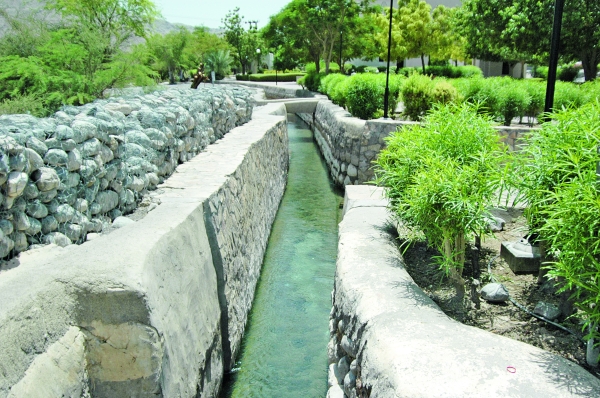
Muscat: Research is underway to determine ways to save water discharged from the aflaj water system. Sultan Qaboos University (SQU) and University of Nizwa (UON) recently penned a research cooperation programme. One of the two joint studies they have undertaken is titled “Balancing Aflaj Water Demand and Supply by Managed Storage: An Optimisation Approach”.
Falaj (the singular form of aflaj) is water that runs through a channel dug in the earth. Its source is groundwater found in the subsoil or mountains or valleys. It is a system that uses gravity to bring water from higher ground to plains. This water mainly irrigates farm lands, besides aiding domestic use. Some aflaj in Oman date back to the 5th century.
Dr Azizallah Izady from the Iranian city of Masshad is the principal investigator (PI) of the SQU study. He said a lot of water gets wasted under the aflaj system, adding that his team wanted to find ways and means to store
this water.
“The main problem is that in winter, there is little demand. So, a lot of water from these channels gets discharged and is wasted. In summer, however, the demand is high due to farming activities but you may not find enough water. So, we want to find ways to store water in winter, so that we may use it in the summer,” Izady said.
Izady further said there were a number of measures that one could take to store the aflaj water, but he had decided on one.
“We can determine the amount of water that is getting wasted and the amount that is required downstream. Based on this, we will have to measure the length and the width of channels.
“The width of channels can then be widened, so that it can store more water for later use,” the researcher said.
Another method is to construct an underground dam that can hold water, which can then be used later, he added. Izady disclosed that there were five tasks involved in the research.
The first was to gather relevant data about groundwater. Second was using a gated dam to hold water. The third step would be to determine the amount of water that is required downstream.
Finding out the relationship between demand and the water that is getting wasted would be the fourth task.
The final job is to give recommendations on saving water.
Five of these aflaj channels have been given the United Nations Educational, Scientific, and Cultural Organisation (UNESCO) heritage status. These are Faalaj Al Khatneen, Falaj Al Maliki, Falaj Al Baris, Falaj Al Mafassar, and Falaj Jeela.
Izady said aflaj had been a lifeline for people in the Middle East in ancient times. “Ancient people in the region used to depend heavily on aflaj. In fact, many people still do. For example, in Nizwa, people are reliant on aflaj for farming,” he added.